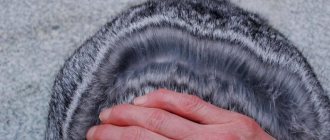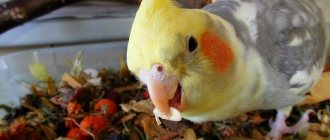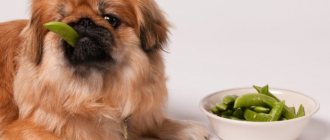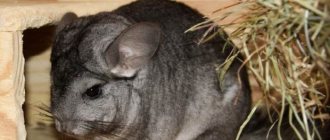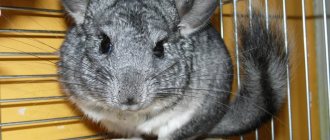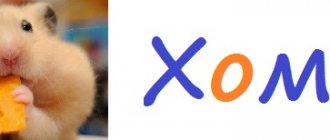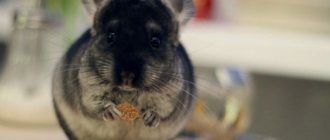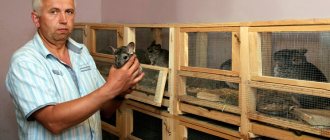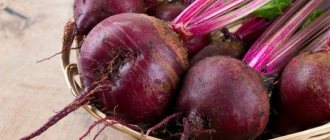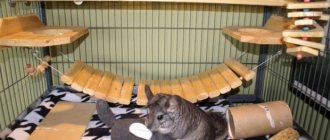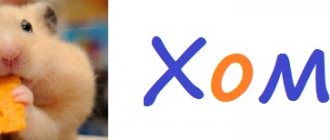The exotic rodent chinchilla is a popular pet with a pretty appearance and excellent health. With proper nutrition and care, a chinchilla can live up to 20 years. It is very important to choose the right diet for your pet. Poor-quality feeding disrupts the functioning of the reproductive and digestive systems and can cause premature death of the rodent.
In the article we will look at feeding chinchillas at home, what can and cannot be given to the animal, the features of the diet and which food is better to choose.
How to feed a chinchilla correctly?
Under natural conditions, the rodent feeds on plants, twigs, dried grass and roots. Your task is to organize a balanced diet, close to the natural diet. The herbivorous animal, despite its small size, eats quite often. At the same time, food for chinchillas should be served in small portions.
Basic principles to adhere to:
- The feeder should never be empty. Make sure that the animal always has fresh and healthy food.
- If you want to change or diversify your chinchilla's diet, do it gradually. Monitor how the animal will react to a new product.
- The menu should be varied, so the rodent will meet its need for microelements and vitamins.
- High-calorie food is the key to thick, shiny fur. Make sure the food meets the animal's energy needs.
- Place branches of an apple or linden tree in the cage so that the rodent can grind its teeth on them. Special stones or toys are also suitable.
Owners of fur-bearing animals often do not know what time is best to feed chinchillas. Since this is a nocturnal animal, care must be taken to ensure that there is food in the cage even at night.
Pure water
A chinchilla needs to have clean water at all times. It is best to give living water from springs, because it contains useful microelements and bacteria. If you do not have the opportunity to take water from springs, then you will have to use what you have, namely filtered water.
You should not take bottled water; it has undergone too much purification and is “dead.”
Keep the water in the drinking bowl clean so that it does not have an unpleasant odor or blooms. The drinking bowl must be washed, preferably every 3-4 days. In general, there are no other requirements for water; the main thing is to keep the drinking bowl clean.
What should chinchillas be fed at home?
The rodent's menu should meet its needs, age and level of physical activity. The animal may have its own food preferences that need to be taken into account.
Main components of the diet:
- roughage, which includes branches, dried grass;
- cereal mixtures.
- delicacies that chinchillas love so much - vegetables, fruits, nuts and berries.
It is better to describe the nutrition of chinchillas in grams based on the generally accepted norm - an adult animal should eat 50-70 grams of food per day. In order for the animal to regularly receive the necessary substances, adhere to the following division: 25-30 grams should be for roughage, the same amount should be for the grain mixture, and the rest of the diet should be for treats.
Treats
Treats for chinchillas are used not only as something rewarding, but also as an additional source of minerals and vitamins. Most often, treats are given separately from the main food.
As a treat you can give:
- Hawthorn fruits,
- Dog-rose fruit,
- Rowan berries,
- Black currant berries,
- cranberries,
- Apples,
- carrots,
- Hibiscus inflorescence,
- Common calendula flowers,
- Linden flowers,
- Bell pepper,
- parsley roots,
- Dandelion roots.
But what the breeder loves - sweets, cakes, pastries, candies - are unacceptable for feeding chinchillas as treats.
However, many novice breeders try to feed their pets with these harmful products and end up with poisoning, severe diarrhea and even death.
What to feed a chinchilla: list
In order for the rodent's digestive system to function normally and its fur to be shiny and thick, include proteins, carbohydrates, lipids, iron, potassium, and magnesium in its diet.
List of products that form the basis of the diet:
- cleaned hay;
- twigs of willow, fruit trees, shrubs;
- dried grass - dandelion, burdock, clover, etc.;
- fresh leaves of trees, bushes;
- corn;
- peas and other legumes;
- fruits - grapes, apples, pears, bananas without peel;
- vegetables (preferably dried) - zucchini, seedless pepper (sweet), tomato;
- seedless berries - wild strawberries, strawberries, rose hips, blueberries;
- nuts – peanuts, walnuts.
What do chinchillas eat during pregnancy and nursing? The nutrition of a rodent during gestation differs from the standard diet. It is recommended to give females sprouted grain, bee bread, oatmeal, nettle leaves, and strawberry leaves.
Daily diet
A chinchilla's diet should consist of:
- 20-25 g of ready-made feed or from the same amount of concentrated feed (grain feed, legumes, oilseeds, bran, cake);
- 20-30 g of hay;
- 4-6 g of green food;
- 4-6 g of additional food (tree branches);
- 2-4 g treats;
- 10-25 g of water.
Chinchillas love precision, so they should be fed at the same time every day (the maximum error can be 1-2 hours).
What can't chinchillas do?
It is forbidden to feed chinchillas food from the table. Human food is not intended for rodents.
Fur-bearing animals are prohibited from eating:
- Meat, animal bones, sausage, cheese, smoked meats. Don't forget, the chinchilla is a herbivore.
- Bakery and confectionery products.
- Rye.
- Too juicy, meaty vegetables and fruits. They can cause gastrointestinal upset.
- Mustard, lilies of the valley, spurge.
- Branches of cherry, plum, chestnut, acacia, apricot trees, pine needles.
- Almonds and pine nuts. They can cause serious poisoning.
What vegetables and fruits can chinchillas eat? Everything except persimmons, tangerines, oranges, grapefruits, lemons, limes, cabbage, potatoes.
Important Principles
The basis of any food is its good quality. That is, he cannot be
- moldy,
- musty,
- stale,
- rancid.
Do not harvest green fodder in contaminated areas:
- on the sides of the roads,
- in industrial areas,
- on fields that have undergone chemical treatment against pests.
You can feed only washed and dried vegetables, fruits and herbs. Green leaves should be dried. Do not feed wet greens, only dry ones.
https://youtube.com/watch?v=xZ7ibGkn6w8
You need to gradually get used to new, especially green food. After each increase in serving size, monitor the condition of your pets.
Follow the feeding schedule.
- Daily.
- One-time.
- Regular.
- Late evening.
Evening feeding is explained by the fact that these animals are active at night. This is written in detail in the article (Farm 27, “Chinchilla at home”).
In the morning you can feed only when everything from yesterday has been eaten. The main evening food should only be poured into an empty and clean feeder.
The chinchilla's body is designed for unfavorable ascetic living conditions. They have a very long intestine, designed to extract maximum benefit from the meager food that they still have to run for. This is what happens in nature. Therefore, by creating conditions that are close to natural, you will save your pet from premature death. And for this you need to pamper him less, feeding him all sorts of goodies.
What do chinchillas eat besides food?
Fur-bearing animals love treats and various vitamin supplements. Although the animal receives most of its nutrients from food, in autumn and winter the animal needs feeding. The daily menu can be diluted with nuts, dried fruits, and berries.
Pet stores sell ready-made treats:
Quick view
PRESTIGE FAIRY HOUSE treat for chinchillas (1 piece)
1 PC
310 ₽
Show all offers
Made in the form of an edible solid toy. The composition includes dried apples, peanuts, seeds, dehydrated pumpkin, carrots. “Fairytale House” will delight you with its original taste and serve as a cozy refuge.
Quick view
VITAKRAFT crackers for chinchillas with herbs (2 pcs)
2 pcs
335 ₽
Show all offers
The composition of crackers includes herbal extracts, grains, seeds, and honey. Baked crackers contain no sugar, flavorings or preservatives. All components are of natural origin, support oral hygiene, and ensure teeth grinding.
Quick view
FIORY STICKS treat sticks for chinchillas with carrots (80 g)
80 gr
267 ₽
248 ₽
Show all offers
A good addition to the main diet. The sticks are made from grains, dried fruits, carrots, seeds and root vegetables.
Give seeds and nuts in limited quantities
Sunflower and pumpkin seeds are found in many foods. But now there is a huge amount of controversy about whether it is possible to give seeds and nuts to chinchillas. You won’t find an exact answer here, but I will write to you all the pros and cons of both approaches so that you can decide for yourself whether you can give these products to your chinchilla.
You can only give dried pumpkin, flax or sunflower seeds. Under no circumstances should you give them fried or salted foods if you care about your pet.
Pros of seeds:
- Chinchillas love them very much, this is a kind of treat for them
- The seeds contain useful substances that make the fur thicker and more pleasant to look at.
Minuses:
- Seeds will lead to obesity of the animal if their quantity is not limited.
- Constipation and other stomach problems
There’s no need to say much about nuts; Shushiki simply adore them and it’s hard not to notice with what pleasure they eat them. BUT IT'S BETTER NOT TO GIVE THEM NUTS, because chinchillas have a very weak liver, and nuts are high in calories and difficult to digest. Many owners cannot resist giving the chinchilla her favorite nuts, but believe me, they eat other treats with the same pleasure. For example, I observed that my chinchilla eats dried apples, carrots, etc. with no less pleasure. Therefore, I see no point in pampering with a product that can cause serious harm to the health of my pet.
Vitamins
To help the animal cope with the disease, support its immune system, and increase resistance to diseases, introduce vitamins into the diet. They are sold in tablet form to ensure proper daily dosage.
The MagiZoo website presents multivitamin complexes for chinchillas:
Quick view
DOCTOR ZOO multivitamin treat for chinchillas (60 tablets)
60 tablets
86 ₽
Show all offers
The vitamin complex includes phosphorus, vitamins of groups A, C, B, E, biotin, iodine, amino acids, fiber, ash components, etc.
Allowed vegetables
Chinchillas have a very sensitive digestive system. Therefore, before offering your furry a treat, you need to thoroughly wash and chop it. Chinchillas can be offered the following types of vegetables:
- carrot;
- broccoli;
- zucchini;
- pumpkin;
- celery;
- cucumber;
- bell pepper;
- tomatoes;
- Jerusalem artichoke.
It is worth noting that vegetables cannot be given to a chinchilla in unlimited quantities. For an adult, a serving of 5-6 g per day will be enough. You also need to ensure that the vegetables offered to the chinchilla are fully ripe. Otherwise, the animal may not only have an upset stomach, but also serious poisoning.
Also, most chinchilla breeders give their pets dill. This is allowed, just don’t overdo it with fragrant weed. The fact is that dill has a powerful diuretic effect. Therefore, after feeding, it is necessary to ensure that the chinchilla receives a sufficient amount of water. In addition, dill is an excellent remedy for bloating and flatulence.
Feeding chinchillas at home
Some conditions and periods of an animal’s life require changes to the established diet. This could be pregnancy, rapid growth, illness. During pregnancy, the animal needs special care. You can slightly increase the portions, support the health of the pregnant female with vitamins, or offer her sprouted oats or barley. After delivery, feed the animal with strawberries and calendula leaves to improve lactation.
During the growth period, it is better for growing chinchillas to be given balanced, low-fat food. A sick animal needs to be shown to a veterinarian, who will find out the cause of poor health and, possibly, prescribe a diet. If the doctor has not given instructions, you need to make sure that the pet does not starve. If the chinchilla refuses to eat on its own, use a soft pipette: chop up the foods that chinchillas eat, and carefully feed the animal.
Menu of a pregnant female
A pregnant chinchilla may eat a little more than usual. This is normal, but you should not overfeed her, otherwise the female’s health will suffer greatly from obesity. Nutrition during this period changes slightly. Veterinarians advise including in the diet of chinchillas:
- sprouted grain;
- food of animal origin (eggs, milk, cottage cheese);
- more protein due to an increase in the proportion of grains;
- apple;
- bee bread 1-2 balls per day;
- alfalfa, strawberry leaves, calendula flowers;
- rosehip, hawthorn;
- flax seeds;
- cereals;
- vitamins and mineral supplements;
- calcium: a quarter tablet of calcium gluconate or 1 tablet of Excel Calcium per day.
Calcium deficiency is dangerous for pregnant females: it causes eclampsia, which without treatment leads to the death of the animal. You need to exclude mint, thyme and lemon balm from your diet.

